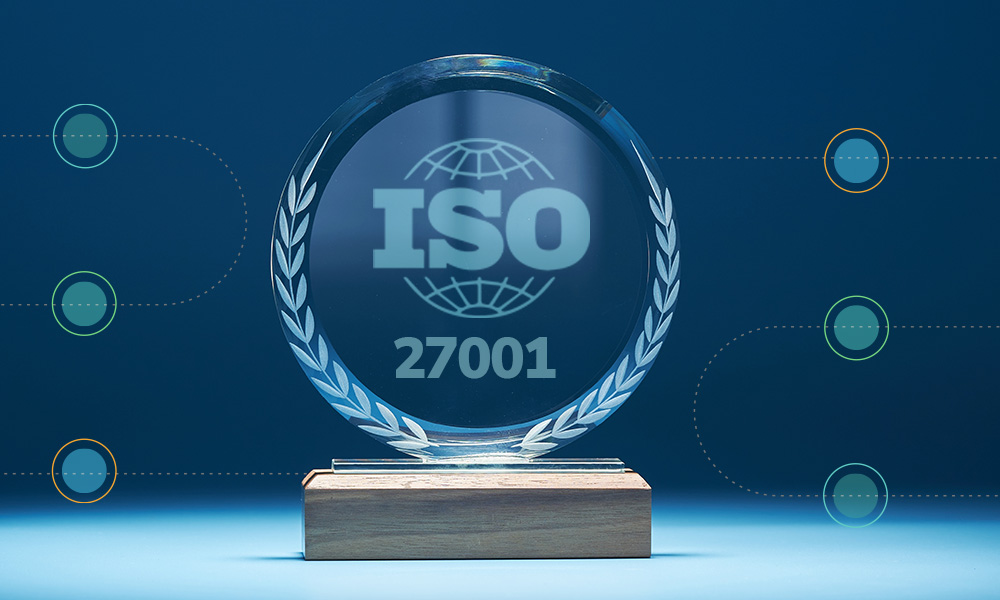ISO 27001 Implementation
ISO 27001 implementation is the process an organisation follows to establish, implement, and maintain an information security management system (ISMS) that conforms to the requirements of the ISO/IEC 27001 Standard. The objective of ISO 27001 is to provide organisations with a standardised approach which outlines how to manage information security proactively, allowing you to identify and manage risks to your organisation.
The ISO 27001 implementation process includes identifying information security risks, defining risk treatment strategies, and putting in place policies, procedures, and controls to protect information assets. Once implemented, the objective of the ISMS is to ensure your organisation can effectively manage, monitor, and continuously improve its information security posture.
Having assisted countless organisations achieve and maintain ISO 27001 certification, URM is the ideal partner to support your implementation of the Standard. We can leverage our in-depth knowledge of and experience with ISO 27001 to ensure you implement the Standard in full conformance with its requirements, whilst still maintaining an awareness of and sensitivity to your organisation’s unique style, culture and needs.
Benefits of ISO 27001 Implementation:
Enhanced Information Security: ISO 27001 provides a structured framework for information security cyber security and privacy protection. By implementing the mandatory requirements of ISO 27001, your organisation can identify, manage and mitigate security risks, ensuring sensitive information is better protected.
Compliance: Implementation of ISO 27001 helps organisations meet legal, regulatory, and contractual requirements related to information security, data protection, and privacy (e.g., the UK General Data Protection Regulation or ‘GDPR’).
Improved Risk Management: By identifying vulnerabilities and threats to information assets, ISO 27001 allows your organisation to better manage and mitigate risks.
Competitive Advantage: ISO 27001 certification demonstrates a commitment to information security, which can build trust with customers, partners, and stakeholders, giving your organisation a competitive edge in the market.
Operational Efficiency: Implementing ISO 27001 can streamline processes by aligning them with best practices, improving operational efficiency and reducing the likelihood of costly security incidents.
Business Continuity: A properly implemented ISMS can help ensure business continuity by mitigating risks that could cause major disruptions, such as cyber attacks or data breaches.
What Does ISO 27001 Implementation Involve?
Implementing ISO 27001 involves a series of steps that focus on identifying information security risks and applying the necessary controls to mitigate them. The implementation process generally requires a cross-functional effort involving IT, legal, HR, and top management to ensure the ISMS is comprehensive and effectively integrated into your organisation's operations.
Key Steps in ISO 27001 Implementation:
URM can offer guidance and support through each step of the ISO 27001 implementation process, steering your implementation to both provide maximum benefit to your organisation and to ensure a successful certification/recertification.
Obtain Management Support:
Successful ISO 27001 implementation is impossible without the commitment from top level leadership as it requires resources, budget, and alignment with business objectives. Management commitment is also a mandatory requirement for certification, and must be documented as evidence.
Define the Scope of the ISMS:
You will need to determine the boundaries of the ISMS by identifying the assets, departments, processes, and locations that need to be included. The scope should align with your organisation’s specific objectives, risk environment, and business needs. The scope of an ISMS can be almost anything, but there are minimum requirements that must be met to achieve certification, highlighted in the points above.
Conduct a Risk Assessment:
Identify information security risks that could affect the confidentiality, integrity, and availability (CIA) of information assets. Assess the likelihood and impact of these risks materialising. This risk-based approach is central to ISO 27001 and helps ensure that security controls are proportional to the actual risks faced.
Develop a Risk Treatment Plan:
Based on the risk assessment, define how to manage each identified risk. Risk treatment options include:
- Mitigating the risk by implementing controls
- Avoiding the risk by discontinuing the risky process or system
- Transferring the risk to a third party (e.g., through insurance)
- Accepting the risk if it falls within the organisation’s risk tolerance.
Annex A of ISO 27001 provides a set of 93 controls that can be used to mitigate risks.
Establish the ISMS Framework:
Create and document the policies, procedures, and processes that form the backbone of the ISMS. Key elements include (but are not limited to):
- Information Security Policy: A high-level document that outlines your organisation’s approach to information security.
- Risk Management Process: A formal process for identifying, analysing, and managing information security risks.
- Statement of Applicability (SoA): A document that lists the ISO 27001 controls your organisation has chosen to implement and those that are excluded, along with justifications for both.
Implement Security Controls:
Implement the necessary technical, physical, and procedural controls to mitigate the identified risks. These controls may include access controls, encryption, incident management processes, staff training, and regular security monitoring. It’s important to note that the implementation should be documented and auditable.
Conduct Awareness and Training Programmes:
Ensure that employees and relevant stakeholders are aware of their roles and responsibilities regarding information security by providing regular training on security policies, procedures, and best practices, therefore helping you to build a security-conscious culture.
Monitor and Measure the ISMS:
Continuously monitor the ISMS to ensure it remains effective and conformant to ISO 27001. This involves regular internal audits, security reviews, and performance measurements to identify areas for nonconformity, corrective actions and improvement.
Conduct Internal Audits:
Internal audits are an essential part of the ISO 27001 implementation process, helping to identify nonconformities and ensure the ISMS is functioning as intended. Auditors review policies, procedures, and controls to verify that they are being properly applied and are achieving the desired security objectives.
Perform a Management Review:
Top management should periodically review the ISMS to assess its performance, address any changes in the risk environment, and ensure that it continues to meet the organisation’s information security objectives.
Prepare for Certification (if applicable):
If your organisation is seeking ISO 27001 certification, it will need to undergo a certification audit by an accredited external body. The certification process typically involves a two-stage audit:
- Stage 1 (Documentation Review): The external auditor reviews key documents to ensure the ISMS is properly documented and aligns with ISO 27001.
- Stage 2 (Implementation Review): The auditor conducts an on-site assessment to verify that the ISMS is fully implemented and operating effectively.
Upon successful completion of the audit, your organisation will receive ISO 27001 certification, which is valid for 3 years with regular surveillance audits to ensure ongoing conformance.
Challenges of ISO 27001 Implementation:
Resource Allocation: Implementing ISO 27001 can be resource-intensive in terms of time, personnel, and budget. It requires cross-departmental collaboration and commitment.
Cultural Change: Employees may need to adapt to new policies, processes, and security requirements, which can require training and a cultural shift towards greater security awareness.
Complexity: ISO 27001 can be complex to navigate, especially for organisations new to information security management. Many organisations opt to work with consultants or specialists, such as URM, to guide them through the process.
Our approach to implementation
URM’s large team of ISO 27001 consultants can provide guidance and knowledge transfer across the full implementation lifecycle of the Standard. Furthermore, URM can offer your organisation 2 levels of support:
- The first level of support is where URM takes the lead in terms of development, and you review and approve
- The second level of support involves URM providing a ‘light touch’ advisory and mentoring service, with you taking responsibility for developing your ISMS and URM reviewing all outputs to assess if they fully meet the relevant requirements of the Standard.
Get in touch
Please note, we can only process business email addresses.
Why URM for ISO 27001?
Risk management expertise
Getting the assessment and management of information security risk right is critical. It is also an area where URM excels and where clients can take advantage of URM’s in-house risk management module, Abriska, with its robust and proven risk assessment methodology and the extensive experience and expertise of its ISO 27001 consultants.
Achieving optimum balance
When helping develop your ISMS, URM’s goal is to achieve the optimum balance between meeting the mandatory management system requirements of ISO 27001 and ensuring your management system is fully sustainable and tailored to your organisation’s size, culture and business objectives
Track record
URM has an unparalleled track record of assisting over 400 organisations to achieve and maintain ISO 27001 certification and is proud to have never been involved in a failed certification project. Our clients have ranged in size from micro businesses to multinationals and come from a diverse range of market sectors and, due to our tailored approach, every one of the 350+implemented ISMS’ has been different.
Practice what we preach
URM has been certified to ISO 27001 ever since the Standard was first introduced in 2005. Furthermore, it became one of the UK’s first organisations to transition to ISO 27001:2022 in April 2023. The experiences gained in maintaining and transitioning certification helps to ensure our consultancy and training services remain current and relevant.

ISO 27001 Control 8.17: Why Clock Synchronisation Is Critical for Security and Conformance
Read URM’s blog, where we explore the importance of clock synchronisation for cyber security and resilience, and how to meet the requirements of Control 8.17.

URM’s blog explores Clause 5.1 of ISO 27001, what you must do to meet its requirements, and why leadership & commitment are vital to an effective ISMS.

URM’s blog breaks down the ISO 27001 certification process, the roles of certification bodies and UKAS, what auditors look for during assessments, and more.

URM’s blog examines how ransomware occur, and highlights practical cyber security measures you can implement to reduce your exposure and mitigate security risk.
